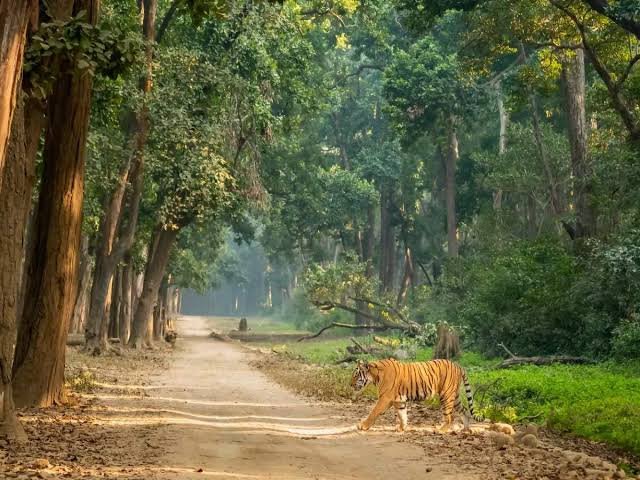In a groundbreaking decision, the Supreme Court has issued a ban on tiger safaris within the core areas of Jim Corbett National Park in Uttarakhand, marking a significant milestone in wildlife conservation efforts. This ruling demonstrates a firm commitment to protecting the natural habitat of these magnificent creatures while addressing the potential adverse effects of tourism on the heart of the forest reserve.
Under the court’s directive, tiger safaris will now only be permitted in the peripheral and buffer zones surrounding the national park. This strategic move underscores the court’s dedication to preserving the integrity of the core areas and ensuring minimal disruption to the wildlife residing within them. By restricting human activity in these critical zones, the court aims to create a safer and more undisturbed environment for the tigers and other wildlife species that call the park home.

The decision comes in response to mounting concerns over illegal construction and tree-felling activities within the Corbett Tiger Reserve, which have posed serious threats to the delicate ecosystem of the region. Former Uttarakhand Forest Minister Harak Singh Rawat and divisional forest officer Kishan Chand have faced strong criticism from the court for their involvement in these damaging activities. This condemnation serves as a reminder of the urgent need for accountability in safeguarding protected areas and preventing further environmental degradation.
Beyond the ban on tiger safaris, the Supreme Court has adopted a comprehensive approach to address broader environmental issues within the Tiger reserve. It has called for a detailed status report within three months, specifically focusing on illegal construction and tree felling. The court has also raised concerns about the troubling nexus between politicians and forest officials, highlighting the detrimental impact of this alliance on environmental conservation efforts.
Read More:- Saudi Arabia is offering Indian travellers a 96-hour stopover visa
To investigate these allegations further and hold the responsible parties accountable, the Supreme Court has entrusted the Central Bureau of Investigation (CBI) with the task and expects a detailed interim report on the progress made. Additionally, the court has signalled its intention to reevaluate the concept of safaris within the Tiger Reserve. A committee appointed by the court will assess this matter and impose necessary conditions to strike a balance between ecological conservation and responsible tourism.
This recent decision by the Supreme Court reflects a broader shift in wildlife conservation approaches, prioritizing an ‘animal-centric’ perspective over tourism interests. By dismissing the National Tiger Conservation Authority’s proposal for tiger safaris within national parks, the court reaffirms its commitment to the well-being of animals and the preservation of their natural habitats.
This move is in line with the court’s previous stance in January, where it expressed reservations about keeping animals in cages at national parks and raised concerns about guidelines promoting tiger safaris in buffer and fringe areas of tiger reserves. The court’s emphasis on preserving natural habitats and minimizing the impact of human activities on wildlife marks a progressive step towards a more sustainable and ecologically responsible approach to conservation.
The Supreme Court’s ban on tiger safaris in Jim Corbett National Park’s core areas reflects its unwavering commitment to environmental protection and wildlife conservation. By addressing illegal activities and reevaluating tourism practices, the court aims to ensure the long-term survival and well-being of the tiger population and other wildlife species in the region, setting a precedent for conservation efforts across the country.
Disclaimer: The above information is a result of research and Axpert Media is not responsible for errors in the same.


